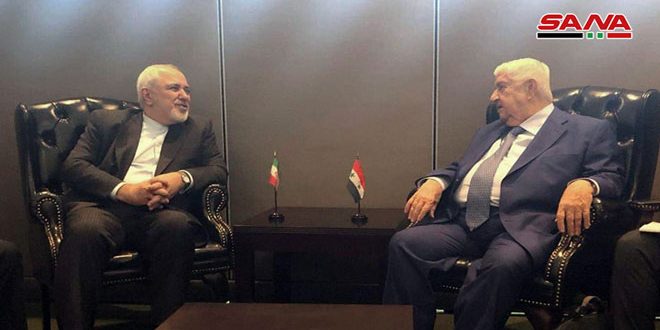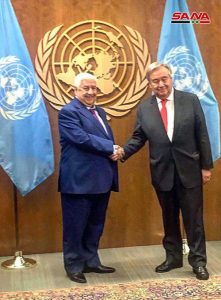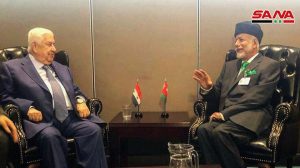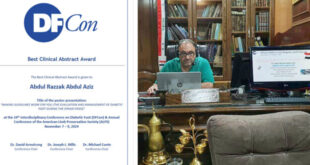New York, SANA- Deputy Prime Minister, Foreign and Expatriates Minister Walid al-Moallem discussed with UN Secretary General Antonio Guterres the political and field developments on the Syrian arena and the recent significant political step represented by the formation of a committee on discussing the constitution.
During a meeting held between al-Moallem and Guterres on the sidelines of the 74th session of the UN General Assembly on Friday, the two sides stressed the importance of going ahead in the fight against terrorism, implementing UN Security Council’s relevant resolutions, in addition to the role that could be played by the UN as a facilitator for solving the crisis in Syria.
Minister al-Moallem expressed Syria’s commitment to cooperate with the UN for launching the work of the committee, asserting that to make work of the committee a success, it should work in a free manner, away from any foreign pressure or interference, taking into consideration that the constitutional committee is owned and led by Syria.
“Any reckless step or action by any party which violates Syria’s sovereignty on all it territory would have the work of the committee failed,” al-Moallem stressed.
For his part, Guterres welcomed the formation of the constitutional committee, pointing out that the formation of this committee, organized and led by the Syrians would be a starting point for a political way towards solving the crisis in Syria.
The UN supports the efforts of Special envoy for Syria to facilitate the Syrian-Syrian dialogue,” Guterres added.
He hoped stability and security would return to all Syrian territory, and Syria would restore its important position in the Arab world and the region, calling for respecting Syria’s sovereignty, independence and territorial integrity.
In the same context, al-Moallem discussed with Czech Republic’s Prime Minister Andrej Babis means of bolstering bilateral relations between the two friendly countries in various domains, as well as Czech role in the reconstruction process in Syria.
The latest developments in Syria and the region, in addition to the efforts exerted for the return of the displaced Syrians to their homeland were also tackled by the two sides.
Al-Moallem appreciated the deeply-rooted historical relations binding Syria and Czech, as well as Czech balanced stance towards the situation in Syria.
He called on Czech to exert its efforts at the EU to lift the coercive illegitimate measures on the Syrian people, welcoming Czech’s participation in re-building what has been destroyed by the terrorist war on Syria.
Babis, for his part, reiterated his country’s stance that calls for finding a political solution to the crisis in Syria to restore security and stability to it and maintains Syria’s sovereignty, independence and territorial integrity.
He stressed his country’s right decision to keep its embassy in Damascus to be able to get acquainted with the reality of the situation in Syria.
In a similar meeting, al-Moallem discussed with his Iranian counterpart, Mohammad Javad Zarif the latest political developments on the Syrian arena and the region, in addition to the deeply-rooted bilateral relations and the necessity of continuing coordination and consultation between Syria and Iran in various levels.
Minister al-Moallem expressed Syria’s high appreciation for Iran’s positive and constructive role in Syria and the region and the help presented for Syria in the fight against terrorism.
He also underlined the importance of enhancing the strategic relations between the two countries to face the US and western pressures represented by the economic terrorism which targets the two peoples as well as the attempt to dominate the two countries’ sovereignty and independence.
Zarif, on his part, expressed his country’s commitment to continued coordination with Syria, offering all forms of support to it and contribution to enhancing the potentials of the Syrian people’s steadfastness in facing the schemes that target the region.
He offered congratulations for Syria over the victories achieved by the Syrian Arab army in its war against terrorism.
Later, al-Moallem discussed with his Omani counterpart Yusuf bin Alawi the bilateral relations and the situation in Syria and the Arab region.
Viewpoints were in agreement that the Arab nation passes through its worst situation, a thing which requires coordination between the two countries to face challenges and projects some other countries try to impose on the region.
H.Zain/Mazen Eyon
 Syrian Arab News Agency S A N A
Syrian Arab News Agency S A N A




